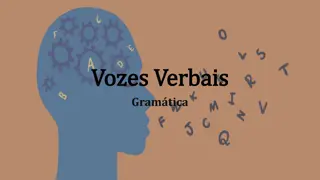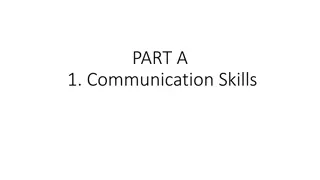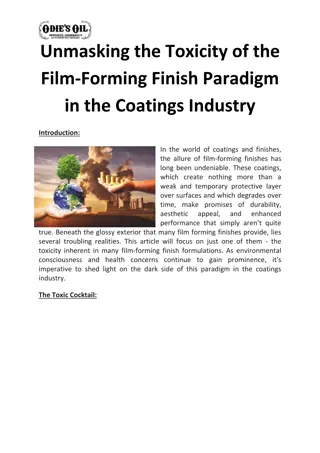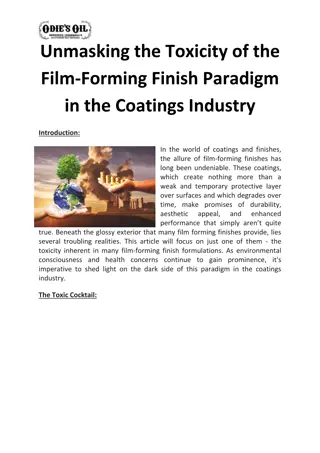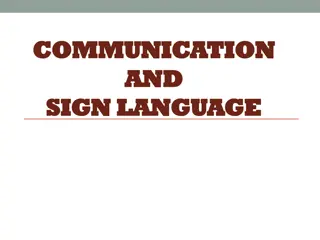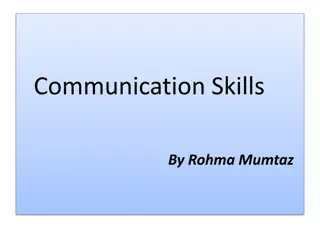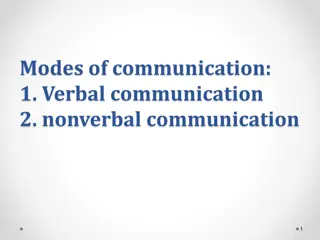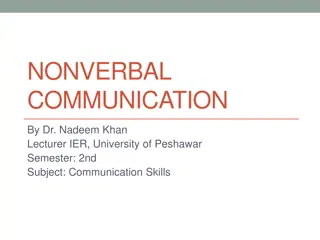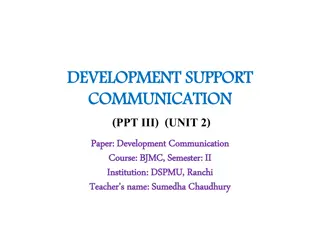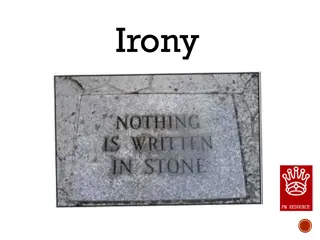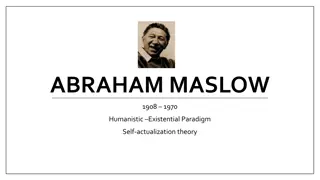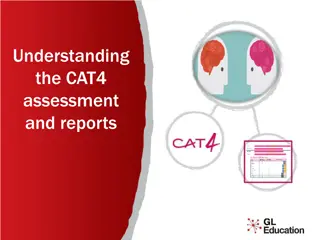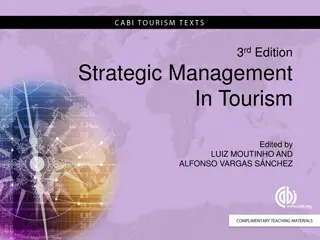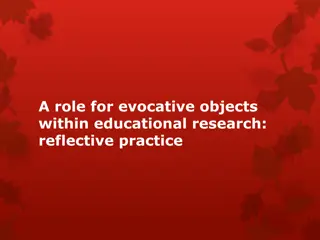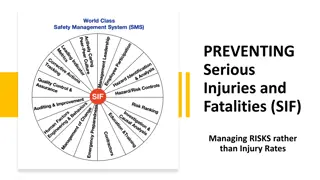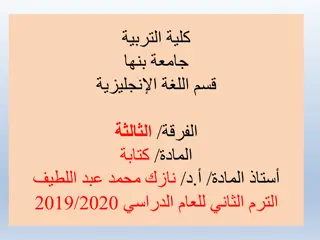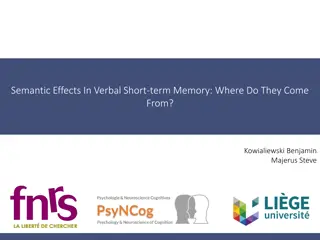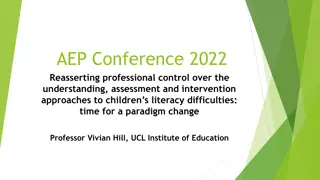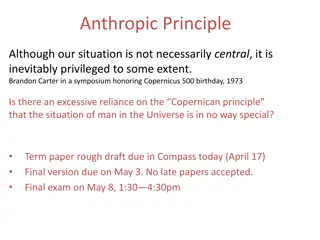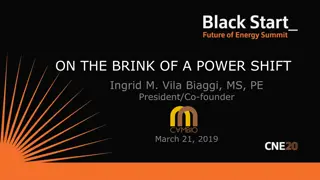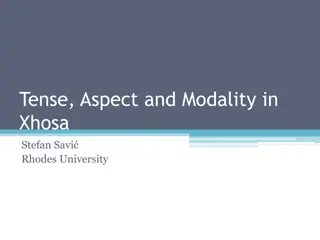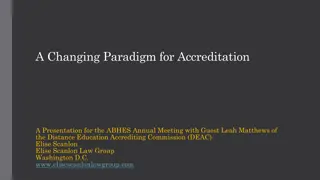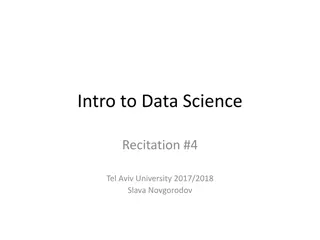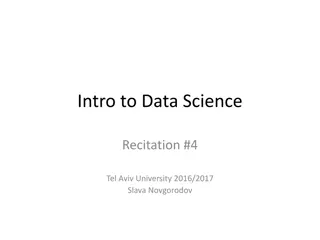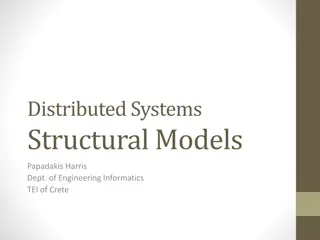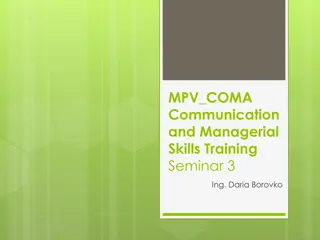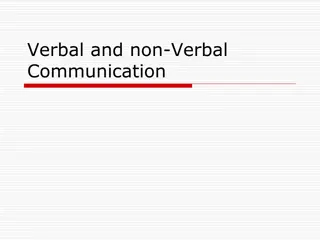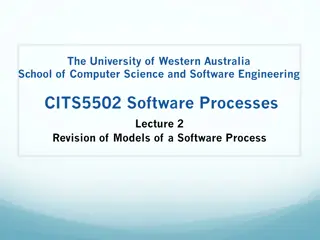A New Paradigm for Spasticity Management
New approach to managing spasticity, a disorder characterized by increased muscle tone and exaggerated tendon jerks. The author, Dr. Darryl Kaelin, explores the benefits of this new paradigm and its potential impact on motor control. The article also includes information on the etiologies and preval
1 views • 39 slides
[PDF⚡READ❤ONLINE] Black Hole Astrophysics: The Engine Paradigm (Springer Praxis
\"COPY LINK HERE ; https:\/\/getpdf.readbooks.link\/B00DGEQPXS\n\nRead ebook [PDF] Black Hole Astrophysics: The Engine Paradigm (Springer Praxis Books) | Black Hole Astrophysics: The Engine Paradigm (Springer Praxis Books)\n\"\n
0 views • 6 slides
Understanding Verbal Voices in Grammar
Verbal voices in grammar determine whether the subject performs or receives the action expressed by the verb. They can be active, passive, or reflexive, each serving a unique purpose in sentence construction. By examining examples and distinctions between active and passive voices, one can grasp the
1 views • 13 slides
Effective Communication: Understanding Styles and Advantages
Communication encompasses various styles including verbal, non-verbal, visual, and written forms. Each style plays a crucial role in conveying information efficiently. Written communication offers advantages like creating a permanent record, meticulous presentation, easy circulation, and suitability
10 views • 21 slides
Mastering Effective Communication in the Workplace
Explore the significance of effective communication, various communication preferences, and strategies to enhance communication dynamics. Dive into non-verbal cues, listening skills, and overcoming barriers to communication. Understand the impact of different communication channels and how to engage
12 views • 40 slides
Understanding Communication Styles and Advantages of Written Communication
Communication is the process of sharing information through various mediums like verbal, non-verbal, written, and visual. Understanding the communication cycle and different styles - verbal, non-verbal, visual, and written - is crucial for effective communication. Written communication offers advant
9 views • 22 slides
Introduction to Projective Diagnostic Assessment
Projective diagnostic assessment is a technique used to reveal subconscious psychological states by presenting ambiguous stimuli for individuals to project their thoughts and feelings. This method helps uncover unconscious conflicts and allows for personality assessment through the interpretation of
4 views • 12 slides
Dostarlimab 7.5 mg /5 ml: Transforming Cancer Care Landscape in India
Cancer care in India is undergoing a paradigm shift with the introduction of a new immunotherapy treatment: Dostarlimab. This potent formulation (7.5 mg\/5 ml) promises to change the treatment paradigm for oncologists as well as patients fighting cancer. Dostarlimab 7.5 mg\/5 ml is a revolutionary i
5 views • 7 slides
Unmasking the Toxicity of the Film-Forming Finish Paradigm in the Coatings Industry
Exposure to toxic fumes emitted by film-forming finishes during application and drying poses significant health hazards to workers and occupants of coated spaces. Painters, contractors, and DIY enthusiasts are particularly vulnerable to inhaling harmful chemicals, leading to respiratory ailments, he
1 views • 5 slides
Unmasking the Toxicity of the Film-Forming Finish Paradigm in the Coatings Industry
Exposure to toxic fumes emitted by film-forming finishes during application and drying poses significant health hazards to workers and occupants of coated spaces. Painters, contractors, and DIY enthusiasts are particularly vulnerable to inhaling harmful chemicals, leading to respiratory ailments, he
1 views • 5 slides
Understanding Verbal Prescriptions in Pharmacy Practice
This comprehensive guide provides insights into obtaining verbal prescriptions, necessary information in a verbal prescription, types of written verbal prescriptions, acceptable sources for verbal prescriptions, authorized personnel to accept verbal prescriptions, laws regarding interns and verbal p
0 views • 18 slides
Understanding Communication and Sign Language
Communication is the vital process of exchanging information, ideas, and emotions through various channels such as speech, signals, and writing. This includes verbal and non-verbal communication, where sign language plays a crucial role. Effective communication depends on the sender, message, channe
1 views • 31 slides
Understanding Communication Skills and Types
Communication is the exchange of information through various mediums like speaking and writing. It can be verbal or non-verbal. Verbal communication involves oral and written forms, while non-verbal communication includes body language and appearance. Each type has its own advantages and drawbacks,
1 views • 13 slides
Understanding Verbal and Non-Verbal Tests
Verbal and non-verbal tests serve different purposes in assessing intelligence and skills. Non-verbal tests utilize images and diagrams to measure reasoning abilities without requiring reading or writing. Verbal tests, on the other hand, assess language-based skills through reading, writing, or oral
0 views • 14 slides
Understanding Modes of Communication and Verbal Messages
Communication occurs through verbal and nonverbal modes, with messages having denotative and connotative meanings. Verbal messages vary in directness, affecting the effectiveness of communication. Indirect messages offer advantages such as politeness and avoiding offense, but can also lead to misund
0 views • 64 slides
Understanding the Importance of Nonverbal Communication in Communication Skills
Nonverbal communication plays a crucial role in conveying messages and signals through platforms like eye contact, facial expressions, gestures, posture, and spatial distance. It includes appearance, body language, silence, time, and space. This form of communication can significantly impact the rec
0 views • 16 slides
Evolution of Development Communication Paradigms and Alternative Paradigm
Development Communication explores the stages of creating a plan, implementing strategies, and ownership paradigms in development projects. Emphasis is on participatory approaches, community empowerment, and inverting top-down processes. The concept of Alternative Paradigm emerges to counter the ali
0 views • 6 slides
Understanding Irony in Verbal, Dramatic, and Situational Contexts
Explore the nuances of verbal, dramatic, and situational irony through examples and explanations. Verbal irony involves saying something different from what is meant, often using humor like puns. Dramatic irony occurs when the audience knows something the characters don't, creating suspense. Situati
0 views • 12 slides
Understanding Abraham Maslow's Humanistic Existential Paradigm
Explore the key concepts of Abraham Maslow's humanistic existential paradigm, including self-actualization theory, perspective, and views on need gratification. Learn about Maslow's belief in human potential, the motive for self-actualization, and the importance of need gratification in realizing in
1 views • 81 slides
Understanding the CAT4 Assessment and Reports
CAT4, the Cognitive Abilities Test Fourth Edition, assesses students' abilities in verbal, quantitative, non-verbal, and spatial reasoning. It distinguishes between ability and attainment testing and is used to identify academic potential, understand student thinking, determine support needs, highli
1 views • 15 slides
Evolution of Strategic Management in Tourism: A New Paradigm
Explore the radical transformations in strategic management over the past 25 years, focusing on the New Strategic Theory and the Half Moon Bay Group initiatives. Discover how complexity, non-linearity, and fluidity guide the new emergent paradigm. Learn about the changes in approach to strategy and
3 views • 11 slides
Evocative Objects in Educational Research: A Reflective Paradigm
Delve into the role of evocative objects in educational research through a reflective practice approach, exploring generative and divergent analysis models, and considering alternative quality criteria. The creative analytic paradigm emphasizes the serendipitous nature of engaging with objects for a
0 views • 21 slides
Preventing Serious Injuries and Fatalities (SIF): A Paradigm Shift in Workplace Safety
The SIF approach emphasizes managing risks over injury rates to prevent serious workplace incidents. Traditional safety metrics focusing on minor injuries may not effectively prevent SIF events. Special attention and a new safety paradigm are needed to address high-risk workplaces and protect worker
0 views • 16 slides
Variety of Verbal Analogy Questions and Practice Sets
Explore a variety of verbal analogy questions and practice sets focusing on different types of relationships between words. From number series to verbal classification, essential parts, analogies, artificial language, and more, these exercises aim to enhance your verbal reasoning skills and logic. L
0 views • 20 slides
Understanding Semantic Effects in Verbal Short-term Memory
Investigating the impact of semantic knowledge and similarity on verbal short-term memory, this study delves into how imageability of words influences recall. Key findings highlight the influence of semantic relatedness and the imageability effect on memory retention, shedding light on the mechanism
0 views • 47 slides
Paradigm Change in Addressing Children's Literacy Difficulties
Professor Vivian Hill advocates for a paradigm change in understanding, assessing, and intervening in children's literacy difficulties at the AEP Conference. Challenges in the field are discussed, including the need to move towards inclusive, universal responses for all children with literacy delays
0 views • 28 slides
Understanding Verbal Irony and Tone Through Examples
Verbal irony is the expression of words conveying the opposite of their literal meaning. It is not the same as lying and is used to emphasize a point. Tone plays a crucial role in conveying irony, as it can affect how the message is perceived. Sarcasm, though related, has a negative agenda of mockin
0 views • 7 slides
Understanding the Anthropic Principle and the New Paradigm in Physics
Exploring the Anthropic Principle and the New Paradigm in physics, this content delves into the concept that our existence is inevitably privileged, as well as the potential unification of Quantum Mechanics and General Relativity. It reflects on the conditions necessary for life, the role of physica
0 views • 17 slides
Embracing Paradigm Shift Towards Distributed Power and Clean Energy
The paradigm shift towards distributed power and clean energy brings about a transformative future where individuals play an active role, leading to a society with a stronger local economy integrated globally through innovative exchanges. Technology empowers users to create content and participate i
0 views • 5 slides
Future Mobility: A New Paradigm in Legal Frameworks and Technology
Explore the evolving landscape of future mobility through the lens of legal frameworks and technology advancements. Delve into how traditional taxonomies are inadequate for modern transport innovations, emphasizing the significance of data in conjunction with movement in this dynamic paradigm.
0 views • 23 slides
Tense, Aspect, and Modality in Xhosa Verbal Paradigm
This study on Xhosa language by Stefan Savi from Rhodes University delves into the intricate aspects of tense, aspect, and modality in the Xhosa verbal paradigm. It discusses the structure of Xhosa, its unique features, and how these elements manifest in different tenses and aspects, shedding light
0 views • 42 slides
Changing Paradigm in Accreditation: Legislative Landscape and Recommendations
This presentation discusses the evolving paradigm in accreditation within the education sector, focusing on legislative updates, including the introduction of bills, hearings, and the shifting responsibilities of accrediting bodies. It also highlights the recommendations put forth by the HELP Task F
0 views • 11 slides
Introduction to Map Reduce Paradigm in Data Science
Explore the MapReduce paradigm in data science through examples, discussions on when to use it, and implementation details. Understand how MapReduce is utilized for processing and generating big data sets efficiently.
0 views • 52 slides
Introduction to MapReduce Paradigm in Data Science
Today's lesson covered the MapReduce paradigm in data science, discussing its principles, use cases, and implementation. MapReduce is a programming model for processing big data sets in a parallel and distributed manner. The session included examples, such as WordCount, and highlighted when to use M
0 views • 48 slides
Understanding Client-Server Paradigm in Distributed Systems
Client-server paradigm in distributed systems involves structuring systems as collaborating processes where clients request services from servers. The model follows a request/reply protocol, with servers providing centralized control of shared resources. Advantages include security and simplicity, w
1 views • 30 slides
Effective Sermon Delivery Techniques for Engaging Presentations
Enhance your sermon delivery skills with insights from Dr. Rick Griffith and Ken Davis on the importance of non-verbal communication, proper gestures, audience-oriented movements, and dressing appropriately. Learn how to communicate effectively through both verbal and non-verbal cues for impactful p
0 views • 26 slides
Mastering Non-Verbal Communication in Managerial Skills Training
Explore the intricacies of non-verbal communication, including body language, tone of voice, and facial expressions, in the context of managerial skills training. Learn to detect signs of lying, evaluate interest and criticism, and recognize attitudes such as boredom and defensiveness. Enhance your
0 views • 34 slides
Understanding Verbal and Non-Verbal Communication
Verbal communication involves both speaking and listening, with listening being equally essential. It can be classified into sympathetic and empathetic listening, each serving different purposes in understanding others' feelings. Sympathetic listening involves sharing emotions, while empathetic list
0 views • 52 slides
Understanding the Body, Soul, and Spirit Paradigm in Human Existence
Exploring the concept of ternary anthropology introduced by French anthropologist Michel Fromaget, which views humans as composed of body, soul, and spirit. This paradigm, rooted in both Eastern and Western traditions, delves into the ontological value of the mind and the overall human experience. T
0 views • 36 slides
Overview of Software Process Models and Prototyping Paradigm
This document discusses different models of software processes, including Waterfall, Prototyping, and Agile paradigms. It covers key concepts, levels of abstraction, 12 activities in every software project, and the phases of the Waterfall model. Additionally, it explores the Prototyping Paradigm and
0 views • 15 slides

![[PDF⚡READ❤ONLINE] Black Hole Astrophysics: The Engine Paradigm (Springer Praxis](/thumb/21503/pdf-read-online-black-hole-astrophysics-the-engine-paradigm-springer-praxis.jpg)
